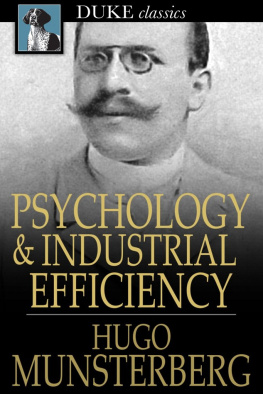Hugo Munsterberg - Psychology and Industrial Efficiency
Here you can read online Hugo Munsterberg - Psychology and Industrial Efficiency full text of the book (entire story) in english for free. Download pdf and epub, get meaning, cover and reviews about this ebook. publisher: Duke Classics, genre: Science. Description of the work, (preface) as well as reviews are available. Best literature library LitArk.com created for fans of good reading and offers a wide selection of genres:
Romance novel
Science fiction
Adventure
Detective
Science
History
Home and family
Prose
Art
Politics
Computer
Non-fiction
Religion
Business
Children
Humor
Choose a favorite category and find really read worthwhile books. Enjoy immersion in the world of imagination, feel the emotions of the characters or learn something new for yourself, make an fascinating discovery.
- Book:Psychology and Industrial Efficiency
- Author:
- Publisher:Duke Classics
- Genre:
- Rating:4 / 5
- Favourites:Add to favourites
- Your mark:
- 80
- 1
- 2
- 3
- 4
- 5
Psychology and Industrial Efficiency: summary, description and annotation
We offer to read an annotation, description, summary or preface (depends on what the author of the book "Psychology and Industrial Efficiency" wrote himself). If you haven't found the necessary information about the book — write in the comments, we will try to find it.
Commercial air flight, mass manufacturing, ergonomic design -- many cornerstones of twenty-first century life have been made possible through the study of industrial efficiency and human factors. In Psychology and Industrial Efficiency, pioneering researcher Hugo Munsterberg elucidates many of the core concepts of this field of study.
Psychology and Industrial Efficiency — read online for free the complete book (whole text) full work
Below is the text of the book, divided by pages. System saving the place of the last page read, allows you to conveniently read the book "Psychology and Industrial Efficiency" online for free, without having to search again every time where you left off. Put a bookmark, and you can go to the page where you finished reading at any time.
Font size:
Interval:
Bookmark:

From a 1913 edition
ISBN 978-1-62011-381-3
Duke Classics
2012 Duke Classics and its licensors. All rights reserved.
While every effort has been used to ensure the accuracy and reliability of the information contained in this edition, Duke Classics does not assume liability or responsibility for any errors or omissions in this book. Duke Classics does not accept responsibility for loss suffered as a result of reliance upon the accuracy or currency of information contained in this book.
Our aim is to sketch the outlines of a new science which is tointermediate between the modern laboratory psychology and the problemsof economics: the psychological experiment is systematically to beplaced at the service of commerce and industry. So far we have onlyscattered beginnings of the new doctrine, only tentative efforts anddisconnected attempts which have started, sometimes in economic, andsometimes in psychological, quarters. The time when an exactpsychology of business life will be presented as a closed andperfected system lies very far distant. But the earlier the attentionof wider circles is directed to its beginnings and to the importanceand bearings of its tasks, the quicker and the more sound will be thedevelopment of this young science. What is most needed to-day at thebeginning of the new movement are clear, concrete illustrations whichdemonstrate the possibilities of the new method. In the followingpages, accordingly, it will be my aim to analyze the results ofexperiments which have actually been carried out, experimentsbelonging to many different spheres of economic life. But thesedetached experiments ought always at least to point to a connectedwhole; the single experiments will, therefore, always need a generaldiscussion of the principles as a background. In the interest of sucha wider perspective we may at first enter into some preparatoryquestions of theory. They may serve as an introduction which is tolead us to the actual economic life and the present achievements ofexperimental psychology.
It is well known that the modern psychologists only slowly and veryreluctantly approached the apparently natural task of rendering usefulservice to practical life. As long as the study of the mind wasentirely dependent upon philosophical or theological speculation, nohelp could be expected from such endeavors to assist in the dailywalks of life. But half a century has passed since the study ofconsciousness was switched into the tracks of exact scientificinvestigation. Five decades ago the psychologists began to devotethemselves to the most minute description of the mental experiencesand to explain the mental life in a way which was modeled after thepattern of exact natural sciences. Their aim was no longer tospeculate about the soul, but to find the psychical elements and theconstant laws which control their connections. Psychology becameexperimental and physiological. For more than thirty years thepsychologists have also had their workshops. Laboratories forexperimental psychology have grown up in all civilized countries, andthe new method has been applied to one group of mental traits afteranother. And yet we stand before the surprising fact that all themanifold results of the new science have remained book knowledge,detached from any practical interests. Only in the last ten years dowe find systematic efforts to apply the experimental results ofpsychology to the needs of society.
It is clear that the reason for this late beginning is not anunwillingness of the last century to make theoretical knowledgeserviceable to the demands of life. Every one knows, on the contrary,that the glorious advance of the natural sciences became at the sametime a triumphal march of technique. Whatever was brought to light inthe laboratories of the physicists and chemists, of the physiologistsand pathologists, was quickly transformed into achievements ofphysical and chemical industry, of medicine and hygiene, ofagriculture and mining and transportation. No realm of the externalsocial life remained untouched. The scientists, on the other hand,felt that the far-reaching practical effect which came from theirdiscoveries exerted a stimulating influence on the theoreticalresearches themselves. The pure search for truth and knowledge was notlowered when the electrical waves were harnessed for wirelesstelegraphy, or the Roentgen rays were forced into the service ofsurgery. The knowledge of nature and the mastery of nature have alwaysbelonged together.
The persistent hesitation of the psychologists to make similarpractical use of their experimental results has therefore come fromdifferent causes. The students of mental life evidently had thefeeling that quiet, undisturbed research was needed for the newscience of psychology in order that a certain maturity might bereached before a contact with the turmoil of practical life would beadvisable. The sciences themselves cannot escape injury if theirresults are forced into the rush of the day before the fundamentalideas have been cleared up, the methods of investigation really tried,and an ample supply of facts collected. But this very justifiedreluctance becomes a real danger if it grows into an instinctive fearof coming into contact at all with practical life. To be sure, in anysingle case there may be a difference of opinion as to when the righttime has come and when the inner consolidation of a new science issufficiently advanced for the technical service, but it ought to beclear that it is not wise to wait until the scientists have settledall the theoretical problems involved. True progress in everyscientific field means that the problems become multiplied and thatever new questions keep coming to the surface. If the psychologistswere to refrain from practical application until the theoreticalresults of their laboratories need no supplement, the time for appliedpsychology would never come. Whoever looks without prejudice on thedevelopment of modern psychology ought to acknowledge that thehesitancy which was justified in the beginning would to-day beinexcusable lack of initiative. For the sciences of the mind too, thetime has come when theory and practice must support each other. Anexceedingly large mass of facts has been gathered, the methods havebecome refined and differentiated, and however much may still be underdiscussion, the ground common to all is ample enough to build upon.
Another important reason for the slowness of practical progress wasprobably this. When the psychologists began to work with the newexperimental methods, their most immediate concern was to get rid ofmere speculation and to take hold of actual facts. Hence they regardedthe natural sciences as their model, and, together with theexperimental method which distinguishes scientific work, thecharacteristic goal of the sciences was accepted too. This scientificgoal is always the attainment of general laws; and so it happened thatin the first decades after the foundation of psychologicallaboratories the general laws of the mind absorbed the entireattention and interest of the investigators. The result of such anattitude was, that we learned to understand the working of the typicalmind, but that all the individual variations were almost neglected.When the various individuals differed in their mental behavior, thesedifferences appeared almost as disturbances which the psychologistshad to eliminate in order to find the general laws which hold forevery mind. The studies were accordingly confined to the generalaverages of mental experience, while the variations from such averageswere hardly included in the scientific account. In earlier centuries,to be sure, the interest of the psychological observers had been givenalmost entirely to the rich manifoldness of human characters andintelligences and talents. In the new period of experimental work,this interest was taken as an indication of the unscientific fanciesof the earlier age, in which the curious and the anecdotal attractedthe view. The new science which was to seek the laws was to overcomesuch popular curiosity. In this sign experimental psychology hasconquered. The fundamental laws of the ideas and of the attention, ofthe memory and of the will, of the feeling and of the emotions, havebeen elaborated. Yet it slowly became evident that such one-sidedness,however necessary it may have been at the beginning, would make anypractical application impossible. In practical life we never have todo with what is common to all human beings, even when we are toinfluence large masses; we have to deal with personalities whosemental life is characterized by particular traits of nationality, orrace, or vocation, or sex, or age, or special interests, or otherfeatures by which they differ from the average mind which thetheoretical psychologist may construct as a type. Still morefrequently we have to act with reference to smaller groups or tosingle individuals whose mental physiognomy demands carefulconsideration. As long as experimental psychology remained essentiallya science of the mental laws, common to all human beings, anadjustment to the practical demands of daily life could hardly come inquestion. With such general laws we could never have mastered theconcrete situations of society, because we should have had to leaveout of view the fact that there are gifted and ungifted, intelligentand stupid, sensitive and obtuse, quick and slow, energetic and weakindividuals.
Font size:
Interval:
Bookmark:
Similar books «Psychology and Industrial Efficiency»
Look at similar books to Psychology and Industrial Efficiency. We have selected literature similar in name and meaning in the hope of providing readers with more options to find new, interesting, not yet read works.
Discussion, reviews of the book Psychology and Industrial Efficiency and just readers' own opinions. Leave your comments, write what you think about the work, its meaning or the main characters. Specify what exactly you liked and what you didn't like, and why you think so.










